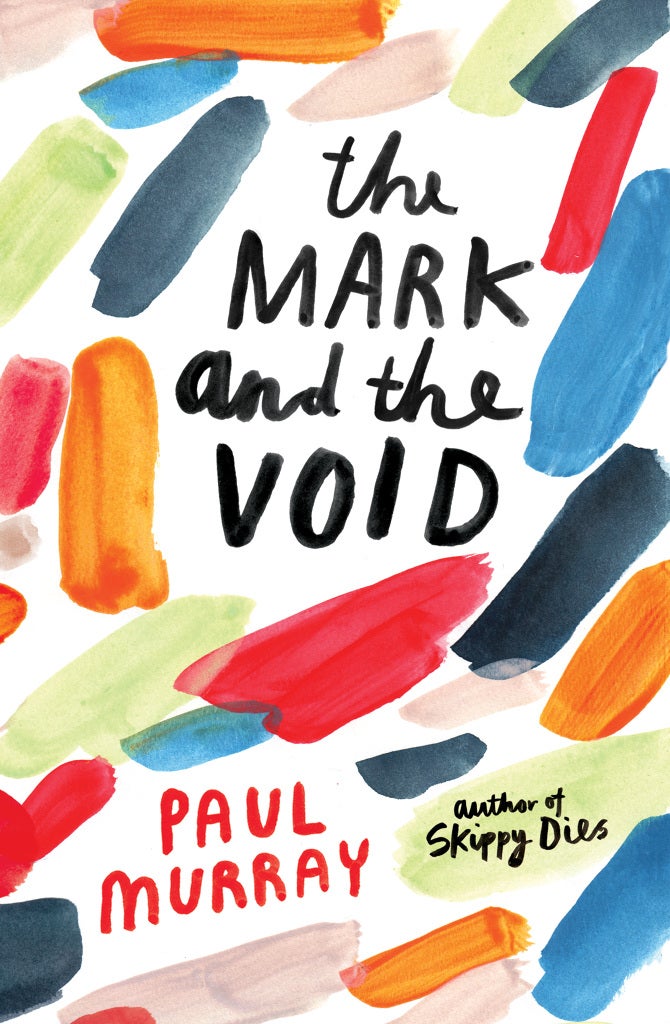The Mark and the Void, by Paul Murray - book review: A joy from start to finish
Hamish Hamilton - £12.99

It was a tall order for Paul Murray to come up with a follow-up to 2010’s Skippy Dies, a novel which I declared in my review to be the funniest book I had read all year. Longlisted for the Man Booker Prize, shortlisted for the Costa, and a finalist for the National Book Awards, Skippy Dies was a bittersweet story of a boy in a Catholic boys’ boarding school in Ireland, and was itself a sequel to Murray’s debut novel An Evening of Long Goodbyes, which was shortlisted for the Whitbread First Novel Award in 2003.
I should not have worried about Murray maintaining form. The Mark and the Void is a hilarious, blade-sharp satire on the banking system featuring vividly drawn characters, and it is, once again, the funniest book I’ve read so far this year.
Claude Martingale is a French analyst working in the Bank of Torabundo in Dublin. The son of a blacksmith, he was encouraged to study by his father, who then resented his success as a banker in Paris. Claude fled France to come and work in Dublin, but his father died before they could reach a rapprochement, and Claude has been haunted by this ever since.
Clever but hapless and credulous, he is a perfect target for a writer who has fallen on hard times and is looking for a way to get rich fast. In a nod to the novelist Paul Auster’s habit of placing himself in his books, this fictional writer has the same first name as Murray, Paul.
The Bank of Torabundo is one of the few banks that has avoided exposure to toxic investments in property and derivatives, due largely to the wisdom and caution of its old CEO, but he was judged to be “too conservative”, so he has been ignominiously sacked and replaced by Porter Blankly, a pro golfer and chancer with no degree, no formal financial qualifications or successes, and a policy of risk-taking and immoral practice in the previous bank where he was the CEO, and which crashed. Blankly is racist, sexist, and drives his wives to suicide. He is an artfully odious creature, more self-serving than even Martin Amis’s John Self or Keith Talent, the darts player. Blankly is in the habit of sending his employees cliches such as “All That Glitters is not Gold”, or “A Stitch in Time Saves Nine”, and the employees scrabble around to find deep inner meaning in these banal statements
The world of banking is conjured up with skill and acuity. There are numerous touches which would be too implausible to be true were they not echoes of the crisis-ridden banks in the real world; self-parodies such as millions of government bail-out money being used to fund yet more bonuses for failed bank executives, and the political machinations behind such aid. The inspiration for the failing fictional Irish bank is the real life Anglo Irish. Claude is drawn perfectly as the intellectual but gullible hero, and Murray covers any unfeasible turns in the story such as his continued funding of Paul by making it clear that Claude does have suspicions, but wishes to encourage creativity.
There is a cast of sterling characters. Jurgen, Claude’s superior, is an emotion-free German who used to play songs about people seeking business loans with fellow German bankers in a reggae band called Gerhardt and the Mergers. There is an aloof but supremely talented, heavily-lidded Indian writer with an eye for beautiful young women, presumably based on Salman Rushdie.
But the real star of the story is Ish, Claude’s best friend in the bank. She previously studied anthropology and she alone among the bankers seems to spot that the emperor has no clothes. She is human and irreverent. After an exchange on the Bank of Torabundo being too big to fail, she says: “Did I ever tell you about my Aunt Nelly? ... She was always bragging that her tits were too big to fail. Every Saturday night she’d go out without so much as a lick of lippy on. ‘Don’t need it,’ she’d say. ‘Got these’. Then one day she was leaning over her fishpond and she fell in.”
Ish has travelled extensively. Torabundo is a volcanic island in the Pacific Ocean with kindly tax laws for tax avoiders, and Ish was struck by the gift economy in a different Polynesian island where goods are not sold or exchanged but simply given away, the antithesis to the dog-eat-dog world of the banks.
As in Skippy Dies, unrequited love features. Ish is in love with another character, but he is oblivious to her, himself being obsessed by another woman, one who abhors the materialism and immorality of the banking world. As in Skippy Dies, the ending is not aspartame-sweet but heart-rending. A joy from start to finish.
Subscribe to Independent Premium to bookmark this article
Want to bookmark your favourite articles and stories to read or reference later? Start your Independent Premium subscription today.

Join our commenting forum
Join thought-provoking conversations, follow other Independent readers and see their replies